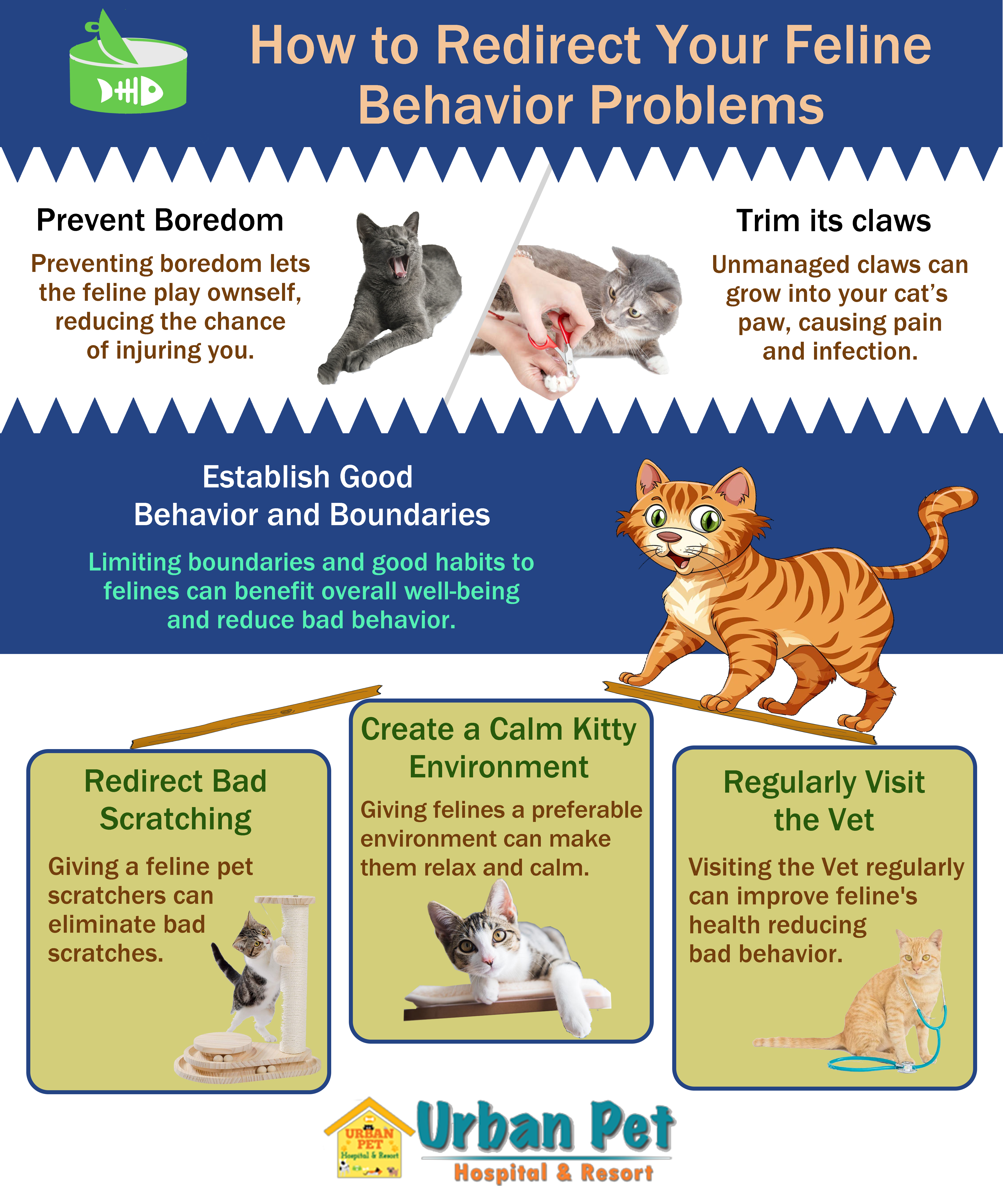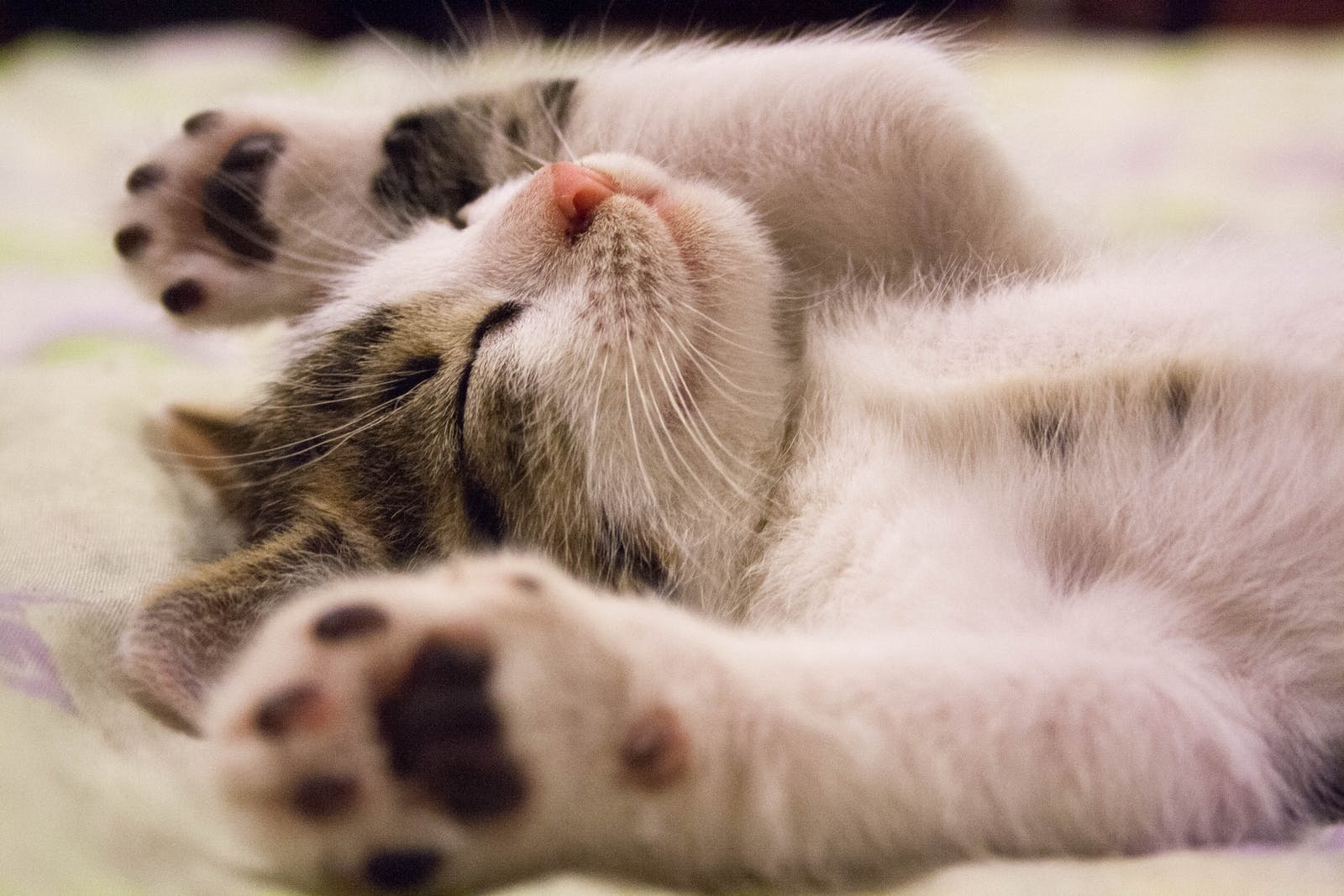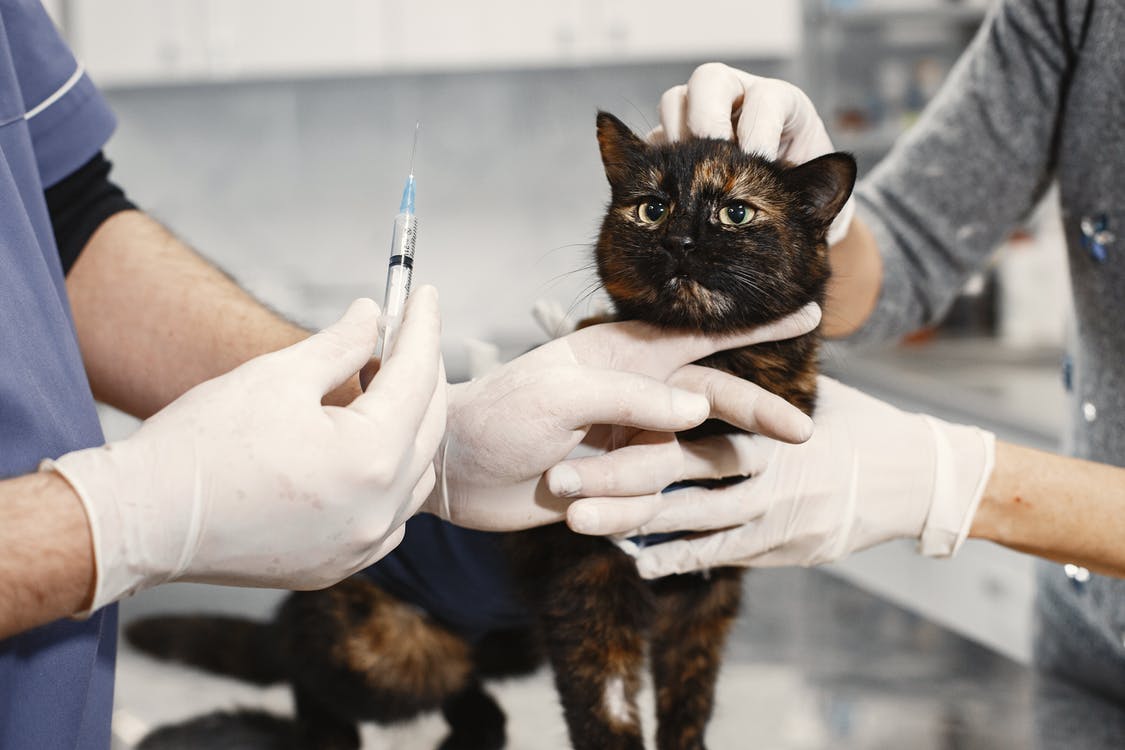Have you ever been enraged by your cat's destructive behavior?
Many pet owners complain that their felines scratch furniture, clothes, house soiling, chew rugs, or even munch houseplants.
Aggressive behavior destroys valuable items at home and may frighten your family members, causing possible cat-scratch injury and disease.
Preventing your cat from boredom, trimming their claws, creating a calm environment, redirecting destructive scratching, establishing their good behaviors, and taking them to vet's visits is the best way to deal with feline behavior problems.

It starts as playful behavior in kittens; unless you limit such behavior, the young feline may carry this aggressive behavior into adulthood.
Therefore, you must help them learn to control their behavioral problems early.
Read on to learn about cat behavior problems and what you need to do to fix them.
What are the Cat's Behavior Problems?
Biting and scratching are usually normal because it signifies their instinctive behavior.
They occasionally do it to express their emotions, like excitement or stress, spot objects with their scent, remove the dead part of their nails, or get a good stretch.
But doing it often, accompanied by other behavioral problems such as becoming aggressive and causing damage to you or your family, may entail behavioral issues.

In fact, the infection rate from a cat bite and scratch is pretty high. According to healthline, infection occurs in about 50% of cat bites in children. Roughly 400,000 cat bites occur in the US each year.
Signs of Your Cat's Behavioral Problems Include:
- Scratching: Cats have a natural urge to scratch objects to keep their claws sharp and mark their territory, causing them to scratch inappropriate household items.
- Chewing: Felines chew on stuff and even manage to cause holes or damage with their teeth on household items.
- Urinary Problems: Inappropriate urination is the most common behavior problem, and most cats will eliminate outside their litter box.
- Aggression: Stress, anxiety, or other medical problem can cause your cat to become aggressive towards other pets and people.
- Compulsive Behavior: Sometimes, your cat may be unable to stop itself from repeating certain behaviors.
- Excessive Self-grooming: Cats are known for being clean animals due to their habit of grooming themselves by licking fur. Sometimes, self-grooming can become extreme to the point of creating bald spots.
Ways to Redirect Your Feline Behavior Problems
Fortunately, these behaviors can be managed with an appropriate plan, training, and patience.
With patience and understanding of the most effective approach that depends on your cat's personality, it is possible to discipline your feline and stop behavior problems.
Let's look at the ways that can be used to redirect your feline behavior problem and encourage them to behave correctly.
1. Prevent Boredom
Chewing behavior on inappropriate objects may be caused by boredom, and your cat may need other diversions.

In such a case, consider using toys to distract them.
Doing this will allow your feline to play with themselves, preventing them from injuring you.
2. Trim its claws
Cats need their claws to scratch to keep their nails healthy.
However, unmanaged claws might grow into your cat’s paw pad, causing pain and infection.

Clip cat’s claws regularly to maintain a healthy length for hygiene, eliminate destructive scratching, and minimize damage to their surroundings and themselves.
Follow the simple tips to help you trim your cat’s claws.
- Gather your nail trimming supplies.
- Find a quiet spot and a comfortable position to keep your cat calm, making cutting their nails easier.
- Pick up one of your cat’s paws and hold the paw in a natural position.
- Squeeze the paw gently to extend their nail.
- Use the clippers to trim the tip of your cat’s nail.
To help your cat enjoy the experience, you can try giving your cat a treat after every nail trim.
Check this infographic for more information.

3. Redirect Bad Scratching
Scratching is normal behavior for cats to stay calm and healthy.
You do not want them to scratch you or damage your furniture or precious belongings anymore.

- Spray bad-tasting pet repellant on fabrics and rugs to deter chewing.
- Get strong, stable, durable scratching posts that encourage your cats to scratch.
- Place the posts in areas where your cat enjoys playing or relaxing.
- Spray the furniture or couch with a citrus scent as cats dislike the smell of citrus.
- Get help from a veterinarian and prescribe medications that decrease your cat’s desire to chew on inappropriate targets.
- Reward your pet if you see them using the scratch pole instead of scratching the furniture and other items.
4. Establish Good Behavior and Boundaries
Try to train your cat for good behavior at a young age as it is much easier to train a cat while they are youthful than when they are older and stuck in their ways.

If your cat gets highly aggressive and frequently bites or scratches you, consider the following options.
- If this behavior occurs, stop playing with your cat right away. Get away from your cat and out of striking range and do not fuss or reward them with attention.
- Ignoring your cat, walking away, and leaving them alone to calm down without interaction for a specific time are the best ways to stop aggressive play.
- Do not use your hands as toys since they have fully developed jaws and claws. They will assume they can always play this way.
- Positive reinforcement works wonders in cat behavior training. Offer rewards in the form of unique, high-value treats to help your cat remember what sort of behavior is expected of them.
Be sure to do this every time your pet becomes aggressive, and they will soon learn that bad behavior means that they will be ignored.
In fact, keep in mind that cats respond best to positive reinforcement, so stay calm and patient.
5. Create a Calm Kitty Environment
Cats are delicate, meticulous animals that prefer routine, so any change in their territory can cause stress.
Stressed or anxious kitties are more likely to display aggressive behavior like biting, chewing, or scratching behaviors.
It may be that the cat feels trapped or insecure due to a change of environment.

Sometimes the best solution is to prevent your cat from behaving by taking them to a calm environment or leaving them alone.
In such a case, consider the following options.
- Ensuring your cat feels safe, loved, and at ease in your home is essential.
- Check that you have provided enough resources for every cat, including hiding spots, food, water, litter trays, and scratching posts.
- Make sure your kitty has a routine for meals and playtimes, and try to limit any extra noises or changes in the house.
- Desensitize your cat by slowly and carefully exposing them to things they fear.
- Train your cat to associate something pleasurable, like a treat that may ease their stress and anxiety.
- Add another cat or pet to keep them company.
6. Regularly Visit the Vet
If your cat's behavior problems continue or seem unusually aggressive, they may have underlying health problems.
Pain or illness can cause your cat to feel defensive and make them more likely to attack.
Moreover, your cats could be suffering from undetected wounds, hormone imbalances, distress, roundworm, flukes and tapeworm, and psychological disorders that you won’t even hint about.

Taking them for a complete medical checkup will help diagnose and treat any underlying medical conditions.
Get in touch with the best pet hospital in Urbandale to diagnose the behavioral problems in your cat.
Conclusion
Follow these tips along with some positive reinforcement to curb your cat’s aggressive behavior.
Never use physical punishment as it will only worsen the problem.
Consult with a vet or veterinary behaviorist to address the cat’s destructive behavior. Use these essential insights to eliminate the feline issues before it is too late.
For more information, get in touch with Urban Pet Hospital & Resort, a Certified Veterinarian in Urbandale.